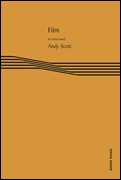We've found 1000 matches for your search. Order by
Results
-
 £26.50
£26.50Annie Laurie (Solo Cornet/Brass Band)
Solo Cornet with Brass Band
Estimated dispatch 7-14 working days
-
 £33.00
£33.00Appassionata (Solo Cornet/Brass Band)
Solo Cornet with Brass Band
Estimated dispatch 7-14 working days
-
 £26.50
£26.50 -
 £26.50
£26.50Carnival of Venice (Solo Cornet/Brass Band)
Solo Cornet with Brass Band
Estimated dispatch 7-14 working days
-
 £16.00
£16.00Eventide (Air Varie) (Solo Cornet/Brass Band)
Solo Cornet with Brass Band
Estimated dispatch 7-14 working days
-
 £24.95
£24.95FILM (Baritone Solo with Brass Band Parts) - Scott, Andy
Brass Band parts only. A feature for solo baritone in a melodic & atmospheric Ennio Morricone inspired piece. Dur: 3:30
Estimated dispatch 7-14 working days
-
 £15.00
£15.00FILM (Baritone Solo with Brass Band Score) - Scott, Andy
Brass Band score only. A feature for solo baritone in a melodic & atmospheric Ennio Morricone inspired piece. Dur: 3:30
Estimated dispatch 7-14 working days
-
 £26.50
£26.50Fleur de Lis (Solo Cornet/Brass Band)
Cornet Solo with Brass Band
Estimated dispatch 7-14 working days
-
 £26.50
£26.50Flying Scot, The (Cornet Solo/Brass Band)
Solo Cornet with Brass Band
Estimated dispatch 7-14 working days
-
 £37.95
£37.95FOLKS WHO LIVE ON THE HILL, The (Flugel Horn Solo with Brass Band) - Richards, Goff
Flugel Horn Solo & Brass Band. Recorded on Polyphonic QPRL045D Making Tracks
Estimated dispatch 7-14 working days
